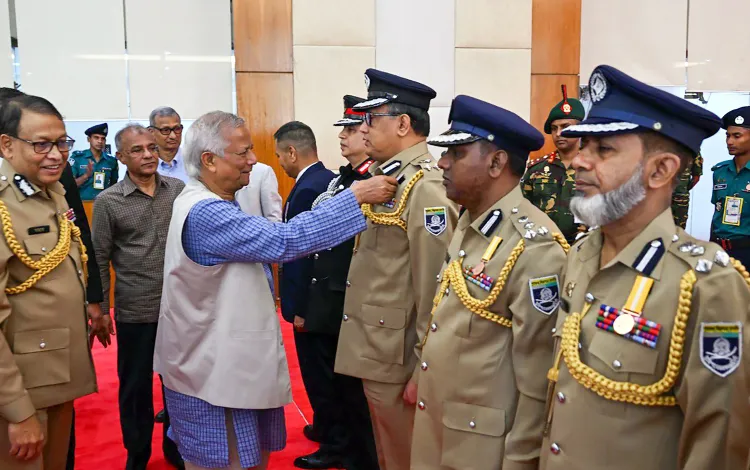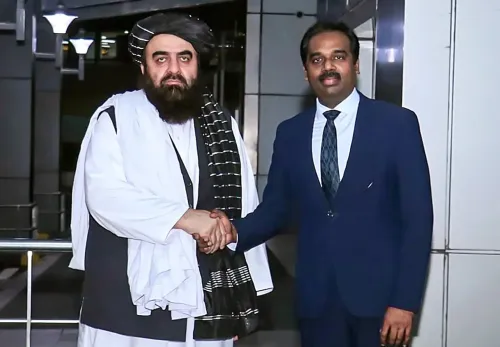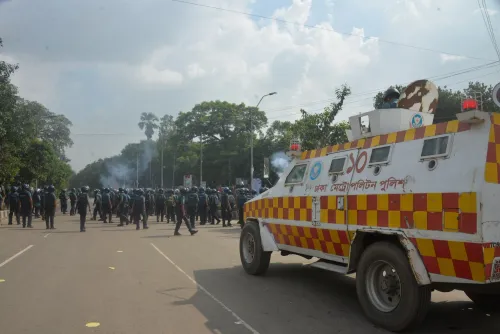Is Bangladesh's Journey Towards an Islamist State Inevitable?

Synopsis
Key Takeaways
- Bangladesh's Armed Forces are under threat from the pro-Islamist regime.
- The regime aims to replace the military with an ideologically driven militia.
- International response is critical to prevent regional instability.
- Suppression of opposition parties is part of a broader strategy for one-man rule.
- The future of Bangladesh's democracy hangs in the balance.
Dhaka, Oct 9 (NationPress) Bangladesh is now on the edge of an extraordinary national disaster. Under the pretense of reform and accountability, the pro-Islamist administration of Muhammad Yunus has initiated the dismantling of the country’s most essential institutions - the Armed Forces and the Directorate General of Forces Intelligence (DGFI). What seems like a judicial proceeding is, in fact, a political purge intended to substitute the loyal defenders of Bangladesh's sovereignty with a militant, ideologically motivated "Islamic Revolutionary Army". This transformation poses a grave risk, potentially converting Bangladesh from a moderate Muslim democracy into a jihadist state reminiscent of Iran or Afghanistan.
As expected, the regime in Dhaka, under the leadership of Muhammad Yunus, has started executing its plan to establish an Islamic Revolutionary Army (IRA) by disbanding the Bangladesh Armed Forces and the nation’s principal intelligence agency, the Directorate General of Forces Intelligence (DGFI).
Credible media sources indicate that investigators have filed a chargesheet against 11 military officers, including eight Generals, accusing them of committing "crimes against humanity" - offenses that carry the death penalty. The charges also implicate former Prime Minister Sheikh Hasina as the main accused. Concurrently, the regime has initiated legal actions to permanently ban the Awami League, Bangladesh's oldest and largest political party, a move clearly designed to eliminate any opportunity for a fair national election, which Yunus plans to conduct in February 2026 under his total control.
The individuals named in the chargesheet include: former Prime Minister Sheikh Hasina, former National Security Advisor Tarique Ahmed Siddique, former DGFI Director General Lt. Gen. (retd) Mohammad Akbar Hossain, former DG Major General (retd) Saiful Abedin, Lt. Gen. (retd) Md Saiful Alam, former DG Lt. Gen. Tabrez Shams Chowdhury, former DG Major General (retd) Hamidul Haque, Major General Towhidul Islam, Major General Sarwar Hossain, Major General Kabir Ahmed, Brigadier General Mahbubur Rahman Siddique, Brigadier General Ahmed Tanvir Majhar Siddique, and Lt. Col. (retd) Makhsurul Haque.
Among these, four are presently serving. However, according to Chief Prosecutor Tajul Islam, under the amended International Crimes Tribunal Act, serving officers accused in such cases are barred from holding official positions.
The foundation of the chargesheet against these senior military officers stems from a dramatized "documentary film" funded by the National Endowment for Democracy (NED) - an organization that has long been involved in discrediting the Bangladesh Army and DGFI.
Sadly, throughout this extensive propaganda campaign, both institutions have failed to establish an effective counter-narrative. Even after Sheikh Hasina's ousting, as Yunus and his allies escalated their assaults on DGFI -- particularly through claims of detentions inside "Aynaghar", a fictitious facility fabricated by a NED-funded, overseas media outlet - the disinformation continued unchallenged. The so-called "documentary" provided fabricated testimonies from alleged victims, which serve as the basis for the current legal assault.
Most critically, the Bangladesh Armed Forces and DGFI had been instrumental during the 2024 anti-Hasina protests, which ultimately facilitated the success of the US Deep State's regime-change operation. More than 14 months after Sheikh Hasina's removal and the establishment of the Yunus regime - a transition that was initially backed by segments of the military - it has become clear that Yunus and his foreign supporters aim to completely dismantle Bangladesh's Armed Forces and counterterrorism establishments to usher in an Islamist Caliphate.
It was previously reported that Pakistan's Army Chief General Asim Munir has been orchestrating this scheme to dismantle the Bangladesh Army and DGFI, collaborating with key figures of Jamaat-e-Islami, Ansar Al-Islam (the local affiliate of Al-Qaeda), and several high-ranking members of the Yunus regime. Despite the current chargesheet targeting former DGFI chiefs and counterterrorism officials, credible intelligence sources suggest that Islamabad's ultimate objective is to implicate Army Chief General Waker Uz Zaman, accusing him of "enforced disappearances and unlawful detentions".
Muhammad Yunus and at least two of his closely connected foreign advisors are believed to be quietly facilitating this initiative, providing legal and diplomatic cover to neutralize Bangladesh's last bastion against Islamist expansion.
In response to this disturbing development, noted military analyst M A Hossain remarked, "This may be the first instance in any nation where high-ranking officials of a national intelligence agency have been prosecuted for defending their country against terrorism. It defies logic. How can a judiciary target its own security defenders in a case evidently masterminded by Pakistan's military establishment and its local proxies? The subsequent step will likely be implicating Army Chief General Waker Uz Zaman - the ultimate command authority - to completely dismantle the Armed Forces".
Defence expert Damsana Ranadhiran, a special contributor to Bangladesh's Blitz media outlet, cautioned: "This legal ambush targeting Bangladeshi Generals will have severe repercussions. It will undermine the military's command structure and pave the way for Pakistan-backed officers to take command. This is a textbook ISI strategy - a fusion of legal warfare, psychological manipulation, and political subversion - akin to what Pakistan executed in Afghanistan and Kashmir".
Ranadhiran further warned that Bangladesh's sovereignty and regional stability are now in jeopardy.
"Bangladesh did not endure the genocide of 1971 only to be subdued again by Pakistan's puppeteers and Islamist collaborators. If Pakistan's ambitions are not countered immediately through diplomatic, military, and legal means, South Asia may plunge into chaos - a region overrun by proxy wars, terror networks, and drug-fueled insurgencies".
These fabricated accusations against senior military officers are intended to discredit and incapacitate the Armed Forces, clearing the path for Yunus to substitute them with a new paramilitary militia modeled after Iran's Islamic Revolutionary Guard Corps (IRGC). The proposed Islamic Revolutionary Army (IRA) will be ideologically loyal to the regime instead of the nation - a characteristic of theocratic authoritarianism.
The animosity stemming from Yunus towards the military is rooted in its potential to oppose his project of surrendering Bangladesh's sovereignty for personal and foreign interests. Similar to his political idol Hamid Karzai, Yunus aims to retain power through foreign patronage rather than public legitimacy.
Analysts estimate his genuine domestic support at a mere five percent. His campaign against the Awami League, which boasts 45 million supporters, is part of a broader strategy to eradicate all political opposition. After banning the Awami League, the regime now seeks to suppress smaller parties such as the Jatiya Party and left-leaning groups to establish a one-man rule under the guise of "national reform".
Alongside institutional purges, Yunus has unleashed a reign of terror against journalists, intellectuals, and dissenters. Hundreds have been imprisoned, and at least 266 journalists face fabricated murder charges - rendering Yunus arguably a more formidable oppressor of the press than Turkey's President Recep Tayyip Erdogan.
Meanwhile, the regime is swiftly replacing the national police with an "Auxiliary Police" modeled after Iran's morality police. Recruited from Hizb ut-Tahrir, Hefazat-e-Islam, and Ansar Al-Islam, this force enforces Taliban-style dress codes and harasses women in traditional Bengali attire. Reports of hijab-clad patrols intimidating citizens are becoming alarmingly frequent.
For decades, DGFI has played a crucial role in combating terrorism and militancy, dismantling insurgent networks, and shutting down foreign-funded terrorist training camps - including those of India’s United Liberation Front of Assam (ULFA). Its success in keeping Bangladesh free from transnational terrorism has made it a target for Islamist extremists and the Pakistani ISI, who now see an opportunity for revenge under the Yunus administration.
Since last year's Jihadist Coup, Bangladesh has been rapidly veering towards Islamist governance. Prominent jihadists - including Ansar Al-Islam leader Jashimuddin Rahmani – have been released from prison and are now allowed to operate freely. Rahmani has publicly vowed to attack secular voices and bloggers, labeling them as "enemies of Islam". Shockingly, the regime has made no effort to re-arrest such fugitives or curb their militant propaganda.
If this trajectory remains unchecked, Bangladesh may soon cease to exist as the secular republic envisioned by the martyrs of 1971. The systematic dismantling of the Armed Forces, intelligence services, and democratic institutions is not just a domestic tragedy - it is a regional security crisis. South Asia cannot afford another failed state ruled by zealots and manipulated by Pakistan’s ISI. The international community, particularly India and democratic allies, must recognize that defending Bangladesh’s Armed Forces today equates to defending the last line of resistance against the spread of militant Islamism in South Asia. Silence is complicity - and complicity in this case could be catastrophic.









